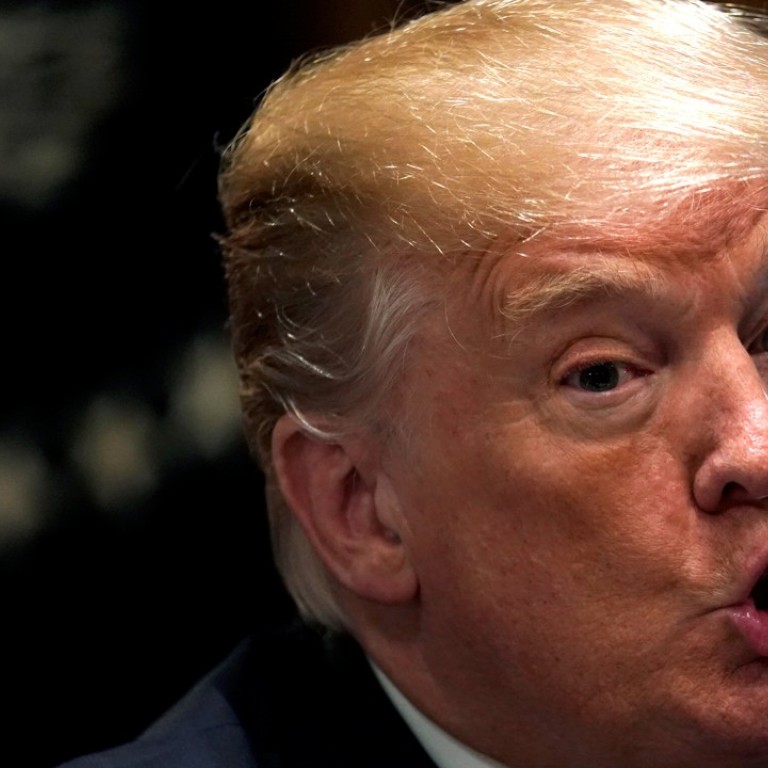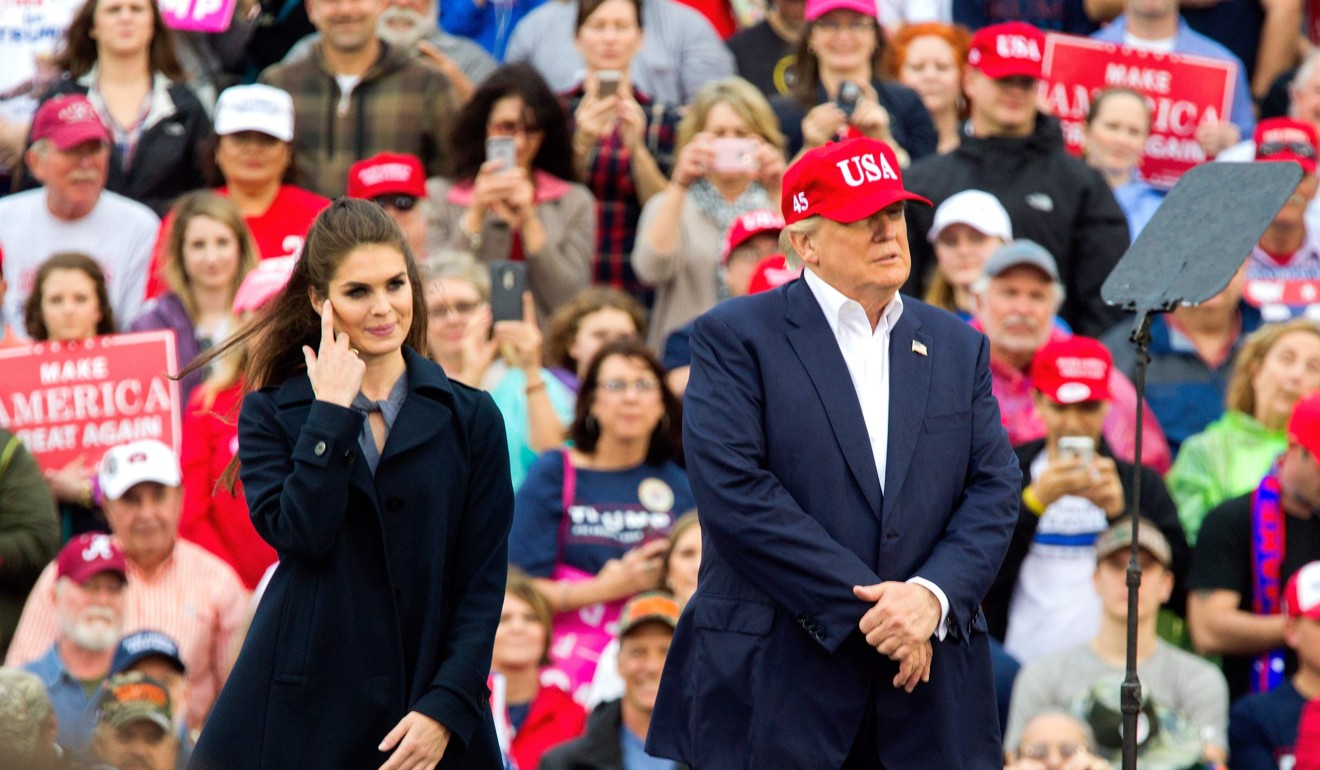
Donald Trump’s not making America great again – in the eyes of the world at least
International perceptions of the US commander-in-chief have undergone an astonishing crash under the Trump administration, except in Russia, Philippines and Israel
Among the world’s most trusted and wide-ranging research organisations must surely be the Washington-based Pew Research Centre – even though its unflinching obsession with fact-based policy insights must put it at the heart of the US’ “fake news” controversies and “anti-expert” politics.
So it was fascinating last week to capture the insights of one of its senior-most researchers transiting Hong Kong, on recent glimpses into the volatile state of US politics, and the roller-coaster transitions in attitudes to the US and its relations with the world, both among Americans and from observers around the world.
Fascinating to learn, for example, that within the US itself, most people’s policy priorities for 2018 focus on terrorism, education policy and the economy (over 70 per cent of people surveyed made these three their top priorities), while climate and the environment attract concern from less than 50 per cent, and that out of 19 policy areas surveyed, global trade attracted the lowest priority of all – a priority for just 38 per cent. So much comfort for those of us in Asia braced for the onset of a deeply uncomfortable trade war.
On trade, also of discomfort to us in Asia, is the finding that indifference towards trade applies to Democrats and Republicans alike. Those of us hopeful for some groups in the US to be concerned about keeping future trade relations on an even keel look likely to be disappointed. Who knows whether a breakdown in Nafta trade negotiations with Canada and Mexico, or an outbreak of trade war with China will lift Global Trade as an issue of concern, but so far there is little sign.
Recent Pew research across 38 countries, assessing what people believe are the greatest global threats, puts the threat from ISIS at the top (62 per cent), with anxiety about climate change a close second. Lower among the threats, but still significant, more people worldwide saw US power and influence as a threat (35 per cent) than power and influence from China or Russia (31 per cent).
In recent research on attitudes inside the US to their federal agencies showed the US Postal Services as the most respected (88 per cent), but showed the FBI as second-most trusted (66 per cent), ahead of the CIA (64 per cent) and far ahead of the Department of Education (53 per cent). I wonder what the White House thinks of this as it trades barbs with the FBI on investigations into Russian efforts to influence elections?

Some of Pew’s most remarkable survey insights focus on global attitudes to the US, and in particular to the US Presidency. Based on a survey of over 40,000 people across 37 countries, Pew revealed last June an astonishing crash in international perceptions of the US President – and I mean astonishing.
Between the end of Barack Obama presidency and two months into that of Donald Trump, confidence that the US President would “do the right thing” crashed from 64 per cent of respondents to 22 per cent – equalling the lowest point of the George W Bush administration. European countries were among the most unimpressed. Confidence fell from 93 per cent to 10 per cent in Sweden, for example, and from 86 per cent to 11 per cent in Germany. In neighbouring Canada, confidence fell from 83 per cent to 22 per cent, and in Mexico, where Obama was already comparatively unpopular, confidence fell from 49 per cent to 5 per cent. So much for Mexican interest in a wall.
Similar falls were seen across Asia, with confidence in South Korea falling from 88 per cent to 17 per cent, and in Australia from 84 per cent to 29 per cent. With allies like these, what prospect does Trump have of winning serious support for any of his main international initiatives?
There were just two countries in which confidence in the US president has risen: Israel, rising from 49 per cent to 56 per cent – even before he had announced plans to move the US embassy to Jerusalem – and in Russia, rising from 11 per cent to 53 per cent. No wonder the Trump-Russia relationship is of such interest to the FBI.
In so far as he cares, Pew research reveals that Trump as president attracts a more powerful “no confidence” vote internationally (74 per cent not confident) than either Xi Jinping in China (53 per cent) and Vladimir Putin (59 per cent).
According to Pew: “In the eyes of most people surveyed around the world, the White House’s new occupant is arrogant (75 per cent), intolerant (65 per cent) and even dangerous (62 per cent).” Just 26 per cent see him as well qualified. Can he get comfort from the fact that survey respondents in the Philippines see him as charismatic and well qualified? But then, here is a country well-used to showman, celebrity leaders.
On all key Trump initiatives – on international trade, climate change, immigration, the Iran weapons agreement, and on the infamous Mexican wall – there was broad based international disapproval.
This would be bad enough if the collapse in confidence were confined to office of the presidency, but Pew indicates that there has been a strong impact too on international attitudes to the US in general. While the world still holds generally positive views of the US’s soft power (58 per cent favourable), and still likes US cultural products like films and TV shows (65 per cent), the Pew research showed that just 43 per cent were impressed by US ideas of democracy, and that 54 per cent had unfavourable attitudes to US effects on local customs.
And these were views expressed in the early days of the Trump administration. It is going to be fascinating to see how views have changed when results of this same survey are released in June this year.
Researchers at Pew think that the likelihood of deeper erosion is small, not just because it would be statistically hard to attract even stronger disfavour, but also because of the recent emergence in many economies, in particular in Europe, of right-wing parties with strong populist and xenophobic views not dissimilar to those that brought Trump to power in the US.
David Dodwell researches and writes about global, regional and Hong Kong challenges from a Hong Kong point of view

